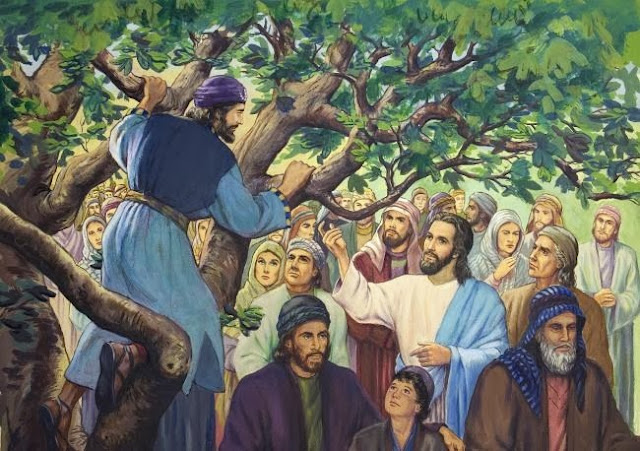"Today salvation has come to this house.... For the Son of Man has come to seek and to save what was lost."
Lk 19:1-10
Click to go to << 31st Sunday in Ordindary Tiime (C) 2007 >>
FROM MOBILE GABRIEL
* 19:1-10 The story of Zacchaeus, the tax collector, is unique to Luke's gospel. Luke uses Zacchaeus, a rich man (as said in Luke 19:2), to provide a contrast with the rich man of Luke 18:18-23. There the rich man was unable or unwilling to detach himself from his material possessions in order to become a follower of Jesus. Here Zacchaeus promises to give half of his possessions to the poor (Luke 19:8) and becomes a recipient of salvation (Luke 19:9-10). For Luke, this exemplifies the proper attitude toward wealth. Wealth in itself is not bad but it often possesses the wealthy to a greater degree than they possess it.
* 19:2 The name, Zacchaeus, means "pure" or "clean." Zacchaeus straddles two of Luke's symbolic worlds. He is the tax collector who responds generously to the call of God. He is also the rich man who liberates himself from his possessions only by great difficulty.
* 19:5 Zacchaeus' action is not at all in keeping with his dignity as either a rich man or as a chief tax collector and, in fact, expresses an extreme longing to see Jesus even if it is from an essentially hidden position. Jesus does not allow Zacchaeus to remain behind the scenes and calls out to him. Jesus then invites Himself to Zacchaeus's house. In the gospels the word, "today," often refers not only to the "today" in which the story took place, but also to the "today" in which the gospel is read. Jesus' presence causes Divine action to occur even in our today. Jesus is still inviting Himself into the lives of those who long to see Him.
* 19:6 Zacchaeus responds with joy and welcomes Jesus in contrast to the usual response given by the wealthy.
* 19:7 The crowd objects to Jesus crossing the boundaries that separate the clean from the unclean.
* 19:8 Jesus has previously responded to the objections of others to His association with "sinners" (5:27-32). Here Zacchaeus, himself, answers the objections by indicating the signs of his repentance. There is some argument as to the tense with which Zacchaeus' statements are to be translated: Some translators read the present tense (here) as futuristic in which case Zacchaeus is saying that he is no longer a sinner because he is resolved to change his ways.
Others read it as iterative or customary in which case he is not a sinner because it is his customary conduct to be generous and just. By the second interpretation, Jesus merely vindicates Zacchaeus' reputation in verse 9. The problem with the second interpretation is that it would make Jesus' presence extraneous to salvation as Zacchaeus would have already achieved it on his own. Thus the first interpretation is more in keeping with the statement of Jesus in verses 9 and 10 as well as with the rest of the gospel. By giving away half of his possessions Zacchaeus is renouncing his identity as a "rich man." The fourfold restoration was traditional in cases of flagrant theft (Exod 21:37 and 2 Sam 12:6) although Zacchaeus as a tax collector could not be legally held to it.
* 19:9 The term translated as "a descendant of Abraham" literally means, "a son of Abraham." Zacchaeus repents and manifests his change of heart by attempting to amend his former ways and thus shows himself to be a true descendant of Abraham and a true heir to the promises of God in the Old Testament. This use of the depiction of Zacchaeus as a descendant of Abraham, the father of the Jews (Luke 1:73; 16:22-31), is based upon Luke's recognition of the central place occupied by Israel in the plan of salvation. Jesus presence has allowed a "rich man to pass through the eye of a needle (18:25)."
* 19:10 This verse sums up Luke's depiction of the role of Jesus as savior in this gospel. Jesus came to "seek out and to save the lost."

No comments:
Post a Comment